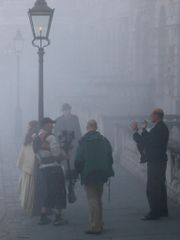 The film director, on the right, gives last
minute direction to the cast and crew, whilst
filming a
costume drama on location in London.
The film director, on the right, gives last
minute direction to the cast and crew, whilst
filming a
costume drama on location in London.
A film director controls the artistic and dramatic aspects of a film. The role typically includes:
- Realizing the overall artistic vision of the film.
- Controlling the content and flow of the film's plot.
- Directing the performances of actors, both by putting them in certain positions and by eliciting the required range of emotions.
- Organizing and selecting the locations in which the film will be shot.
- Managing technical details such as the positioning of cameras, the use of lighting, and the timing and content of the film's soundtrack.
- On occasion, writing the screenplay.
The director will delegate many of these responsibilities to other members of his or her film crew. For example, the director may describe the mood he wants from a scene, then leave it to other members of the film crew to find a suitable location, or to set up the appropriate lighting.
How much control a director exerts over a film varies greatly. Many directors are under the control of the studio and producer. This was true from the 1930s through the 1950s, when studios had many directors, actors and writers under contract.
Other directors have far more control and bring their artistic vision to the pictures they make. Their methods range from those who:
- Like to outline a general plot line and let the actors improvise dialogue
- Control every aspect, and demand that the actors and crew follow instructions precisely
- Write their own scripts such as Quentin Tarantino or Hayao Miyazaki
- Collaborate on screenplays with long-standing writing partners
- Act as their own cinematographers and editors
- Star, often in leading roles, in their films, such as Clint Eastwood or Woody Allen
Directors work closely with film producers who are usually responsible for the non-artistic elements of the film, such as financing, contract negotiation and marketing. Directors will often take on some of the responsibilities of the producer for their films (e.g. Steven Spielberg). The early silent film director Alice Guy Blaché not only produced her own pictures but actually created her own highly successful studio.
The director is usually the individual who visualizes the script and guides the technical crew and actors to carry out that vision. It is the director's sense of the dramatic along with the creative visualization of the script that transforms a screenplay into a well-made motion picture. However the director doesn't always have absolute artistic control. The director is usually selected by the producer, whose job it is to make the decisions that are in the best interests of the production company or studio or network. As such, the producers have veto power over everything from the script itself to the final cut of the film, often in opposition to the director's vision.
External links
- FreeFilmSchool.Org has detailed articles on how to be an independent film director
- Smooth Negotiating: Making the Director Deal
- Director's Guild of America
- A comprehensive collection of interviews with a century's worth of European film directors
Categories: Filming




 216.73.216.133
216.73.216.133 User Stats:
User Stats:
 Today: 0
Today: 0 Yesterday: 0
Yesterday: 0 This Month: 0
This Month: 0 This Year: 0
This Year: 0 Total Users: 117
Total Users: 117 New Members:
New Members:
 216.73.xxx.xxx
216.73.xxx.xxx
 Server Time:
Server Time: